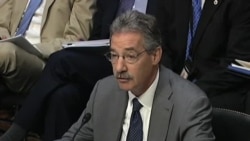CAPITOL HILL —
Top U.S. intelligence and law enforcement officials say the government’s vast domestic data collection activities do not infringe on citizens’ privacy but do help identify and defeat terrorist threats. Officials testified before the Senate Judiciary Committee hours after the Obama administration released documents detailing telephone data collection programs exposed by former intelligence contractor Edward Snowden.
Revelations that the U.S. government collects telephone records have unnerved many Americans, according to committee chairman Patrick Leahy.
“I think the patience of the American people is beginning to wear thin. But what has to be of more concern in a democracy is the trust of the American people is wearing thin," he said.
Wednesday, the Obama administration released previously-classified documents on the extent and limitations of federal telephone snooping.
“These are telephone records maintained by the phone companies. They include the number the call was dialed from, the number the call was dialed to, the date and time of the call and the length of the call," said Deputy Attorney General James Cole. "The records do not include the names or other identifying information. They do not include cell site [cellular telephone location] or other location information, and they do not include the content of any phone calls."
Actual monitoring of phone calls requires special court authorization. Overall, data collection has helped defeat terrorists, according to National Security Agency Deputy Director John Inglis.
“There were 54 plots that were disrupted over the life of these two programs," he said.
The House of Representatives recently voted down a proposal to limit telephone data collection. Similarly, senators showed no inclination to terminate the programs - but did express dismay over the lack of voluntary public disclosure.
“We have a lot of good information out there that helps the American public understand these programs," said Democrat Sheldon Whitehouse. "But it all came out late. It all came out in response to a leaker [Edward Snowden]. There was no organized plan for how we rationally declassify this so that the American people can participate in the debate."
Vast data collection has a chilling effect on freedom, according to Jameel Jaffer of the American Civil Liberties Union.
“People who know the government could be monitoring their every move, their every phone call, or their every Google search will comport themselves differently. They will hesitate before visiting controversial websites. They will hesitate before joining controversial advocacy groups. They will hesitate before exercising rights that the Constitution guarantees," he said.
Not so, says Robert Litt, general counsel in the office of the Director of National Intelligence.
“Collection of this kind of telephone meta-data from the telephone companies is not a violation of anyone’s constitutional rights," he said.
Litt said that disclosure of the programs has damaged the government’s ability to protect the nation.
Revelations that the U.S. government collects telephone records have unnerved many Americans, according to committee chairman Patrick Leahy.
“I think the patience of the American people is beginning to wear thin. But what has to be of more concern in a democracy is the trust of the American people is wearing thin," he said.
Wednesday, the Obama administration released previously-classified documents on the extent and limitations of federal telephone snooping.
“These are telephone records maintained by the phone companies. They include the number the call was dialed from, the number the call was dialed to, the date and time of the call and the length of the call," said Deputy Attorney General James Cole. "The records do not include the names or other identifying information. They do not include cell site [cellular telephone location] or other location information, and they do not include the content of any phone calls."
Actual monitoring of phone calls requires special court authorization. Overall, data collection has helped defeat terrorists, according to National Security Agency Deputy Director John Inglis.
“There were 54 plots that were disrupted over the life of these two programs," he said.
The House of Representatives recently voted down a proposal to limit telephone data collection. Similarly, senators showed no inclination to terminate the programs - but did express dismay over the lack of voluntary public disclosure.
“We have a lot of good information out there that helps the American public understand these programs," said Democrat Sheldon Whitehouse. "But it all came out late. It all came out in response to a leaker [Edward Snowden]. There was no organized plan for how we rationally declassify this so that the American people can participate in the debate."
Vast data collection has a chilling effect on freedom, according to Jameel Jaffer of the American Civil Liberties Union.
“People who know the government could be monitoring their every move, their every phone call, or their every Google search will comport themselves differently. They will hesitate before visiting controversial websites. They will hesitate before joining controversial advocacy groups. They will hesitate before exercising rights that the Constitution guarantees," he said.
Not so, says Robert Litt, general counsel in the office of the Director of National Intelligence.
“Collection of this kind of telephone meta-data from the telephone companies is not a violation of anyone’s constitutional rights," he said.
Litt said that disclosure of the programs has damaged the government’s ability to protect the nation.














